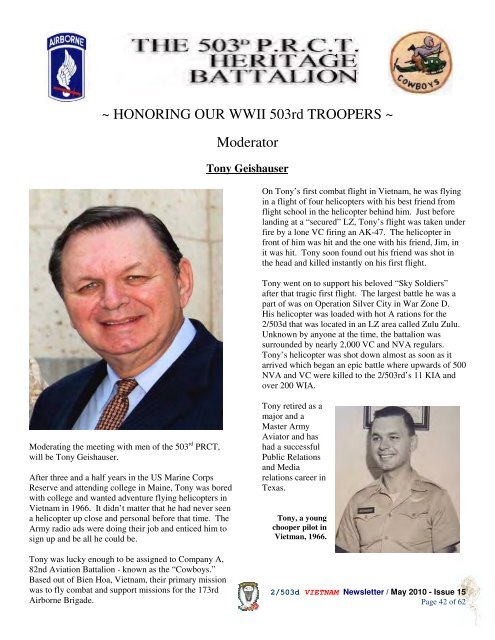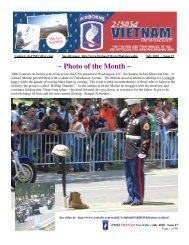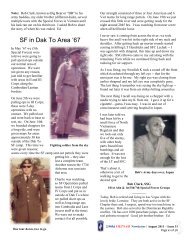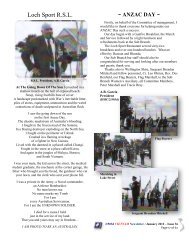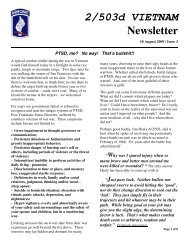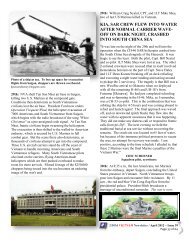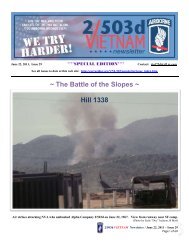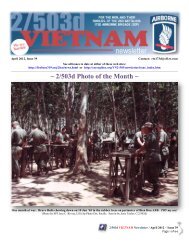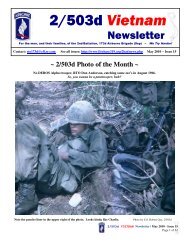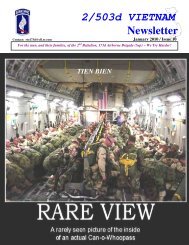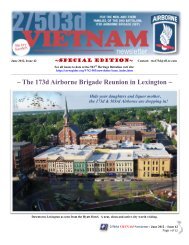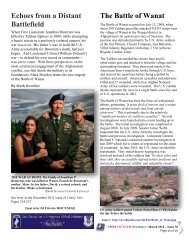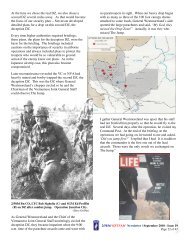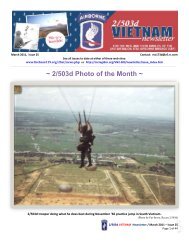Issue 15c - Firebase 319
Issue 15c - Firebase 319
Issue 15c - Firebase 319
You also want an ePaper? Increase the reach of your titles
YUMPU automatically turns print PDFs into web optimized ePapers that Google loves.
~ HONORING OUR WWII 503rd TROOPERS ~<br />
Moderating the meeting with men of the 503 rd PRCT,<br />
will be Tony Geishauser.<br />
After three and a half years in the US Marine Corps<br />
Reserve and attending college in Maine, Tony was bored<br />
with college and wanted adventure flying helicopters in<br />
Vietnam in 1966. It didn’t matter that he had never seen<br />
a helicopter up close and personal before that time. The<br />
Army radio ads were doing their job and enticed him to<br />
sign up and be all he could be.<br />
Tony was lucky enough to be assigned to Company A,<br />
82nd Aviation Battalion - known as the “Cowboys.”<br />
Based out of Bien Hoa, Vietnam, their primary mission<br />
was to fly combat and support missions for the 173rd<br />
Airborne Brigade.<br />
Moderator<br />
Tony Geishauser<br />
On Tony’s first combat flight in Vietnam, he was flying<br />
in a flight of four helicopters with his best friend from<br />
flight school in the helicopter behind him. Just before<br />
landing at a “secured” LZ, Tony’s flight was taken under<br />
fire by a lone VC firing an AK-47. The helicopter in<br />
front of him was hit and the one with his friend, Jim, in<br />
it was hit. Tony soon found out his friend was shot in<br />
the head and killed instantly on his first flight.<br />
Tony went on to support his beloved “Sky Soldiers”<br />
after that tragic first flight. The largest battle he was a<br />
part of was on Operation Silver City in War Zone D.<br />
His helicopter was loaded with hot A rations for the<br />
2/503d that was located in an LZ area called Zulu Zulu.<br />
Unknown by anyone at the time, the battalion was<br />
surrounded by nearly 2,000 VC and NVA regulars.<br />
Tony’s helicopter was shot down almost as soon as it<br />
arrived which began an epic battle where upwards of 500<br />
NVA and VC were killed to the 2/503rd’s 11 KIA and<br />
over 200 WIA.<br />
Tony retired as a<br />
major and a<br />
Master Army<br />
Aviator and has<br />
had a successful<br />
Public Relations<br />
and Media<br />
relations career in<br />
Texas.<br />
Tony, a young<br />
chooper pilot in<br />
Vietman, 1966.<br />
2/503d VIETNAM Newsletter / May 2010 - <strong>Issue</strong> 15<br />
Page 42 of 62
Sent in by Jack (Jackattack) Ribera, A/2/503d<br />
2/503d VIETNAM Newsletter / May 2010 - <strong>Issue</strong> 15<br />
Page 43 of 62
THE PASSING CAPTAINS<br />
By Tony Sierra<br />
D Company, 503 rd PRCT<br />
Tony<br />
Fifty Decembers have passed…<br />
many of them memorable and as in<br />
every one’s life many things transpired<br />
in those periods. Keepsakes of those<br />
cold months have faded like a newly dipped paintbrush<br />
rubbed backwards to the first month. However, it is that<br />
first December standing out as the dominant period<br />
when my life’s emotions crested.<br />
Tock, tick, tock, tick, tock, tick…this was the<br />
merest sound daring to penetrate the solid wall of silence<br />
dominating the neighborhood where I was raised.<br />
Nothing tainted the sky; not a speck of light, not the<br />
tiniest reflection from the ocean of neon bulbs over the<br />
city only blocks away.<br />
Despair and nostalgia slowed me from pressing the<br />
doorbell, as I walked onto the mat astride my Mama’s<br />
front step. Standing before the closed door I conceded it<br />
was fitting the grandfather clock my brother sent years<br />
ago from Germany seemed to run in reverse. After an<br />
eternity away, I returned home this December seeking to<br />
resurrect my youth. Four years had past since last I was<br />
here.<br />
“Dios mio, you are here! Hold me before I drop,<br />
no lo creo, I cannot believe it is you.” Mama squeezed<br />
me with all the strength her heart possessed and shed<br />
tears depressed within her for several years. “Hijo, you<br />
look so marvelous, like a dream…you make a wonderful<br />
Captain with all your ribbons and medals.”<br />
For moments I could say nothing but in the end<br />
I said, “Mama, I am only a Sergeant but whatever I am<br />
does not count. Only that I am here is important.”<br />
The hearts of men come, perhaps rather more<br />
often than those of women, to steep places down<br />
which the least touch will cause them to hurl<br />
themselves.<br />
I flopped on a chair, held Mama as close as I<br />
could and sensed her sobbing against my ribbons and<br />
in her chest was a vigorous pounding. At the<br />
moment all the war things were forgotten and I<br />
whimpered like a baby. I had returned home and<br />
only the clock’s weird ticking and our wailing<br />
disturbed our reverie<br />
As fate decreed, life levelled off a few months<br />
after some of us returned from our wars and others<br />
from their own pursuits. As time went on the<br />
euphoria passed with the appropriate celebrations and<br />
the predictable hangovers. Shortly the days once<br />
again aligned themselves into old routines and in<br />
many cases newer forms of them. We were entering an<br />
era where new Captains were coming forth. Not the<br />
Captains familiar to me, with the medals, ribbons and<br />
the silver bars as Mama had misjudged on the night of<br />
my return, but rather a new breed I thought as Captains<br />
of a new forward movement.<br />
In my telling of events of that long past December<br />
and other forty nine ones following, I use the title<br />
“Captain” generically, I classify my comrades of that era<br />
strong hearted, visionary and courageous, whether they<br />
carried the rifle as I did or not. In my perception we<br />
were all Captains, even if some wore metallic rankings,<br />
others wore cloth stripes while most wore only their<br />
common uniform and what their soul and heart brought<br />
from their naive adolescent years. Additionally, some in<br />
time rose to such high rankings it is difficult to believe<br />
all this really occurred when viewed from my<br />
perspective after the passage of so many decades.<br />
Once the national war time adrenaline, which had<br />
shot so high, returned to normal the race was on to do<br />
things we never dreamed possible. The country sped in<br />
all directions with such intensity that hardly anyone was<br />
left behind. And the drivers of these movements were<br />
the same Captains who had driven the war to a<br />
tremendous victory; it was incredible that many had<br />
risen from such humble beginnings.<br />
(continued....)<br />
2/503d VIETNAM Newsletter / May 2010 - <strong>Issue</strong> 15<br />
Page 44 of 62
Photo taken at Port Moresby airstrip after Nadzab jump.<br />
October or November 1943. This is one of the regiment’s<br />
original squads. It shows a typical, ragtag group of<br />
outstanding troopers. By mid 1945 the entire squad, with<br />
one exception, Tony Sierra, was gone.<br />
And now my Captains became engrossed mainly<br />
in one thing, to get back step by step, the parts of their<br />
life lost or destroyed, by friend or foe, and pay<br />
themselves for everything they had dared and endured.<br />
As there was a Captain in every town and home, they<br />
became a portent.<br />
Politicians feared or wondered at them, planners<br />
and new businessmen served them and themselves<br />
through them.<br />
For they were the new country, the relentless spirit<br />
built in those horrible days when so many battles were<br />
on, never really knowing who was winning, one side or<br />
the other; they were that spirit that forgets nothing, but<br />
maintains itself amid all disasters, and necessities. For<br />
they were perhaps the most concrete expression of our<br />
country’s instinctive survival in spite of its own<br />
perversity and ignorance.<br />
Never in my wildest dream, especially during the<br />
“foxhole” days, did I envision amounting to anything<br />
more than what my forefathers had been. There was<br />
honor in their labor, but that is what it was “labor” and I<br />
together with millions of others anticipated we would<br />
return to only that. What else could we expect? Many<br />
as in my case had never completed high school. And the<br />
entire country was swamped with guys like me with the<br />
military stars still in our eyes never thinking all this<br />
would end one day and the day approached faster than<br />
any of us imagined.<br />
But subtly, while each of us had been about our<br />
“war business,” this enterprise itself planted a seed<br />
within us which was to render a greater service to the<br />
country and in a special way to our families far<br />
exceeding the just-past melodrama of the turmoiled<br />
world.<br />
As each of us strived to once again return to<br />
normal affairs we slowly realized whatever we tried,<br />
even whatever aspirations entered our heads appeared<br />
too mundane, too far beneath the tremendousness of<br />
what we had been through.<br />
This is not to say every one was of the same<br />
sentiment. A great number were able to return to the<br />
exact position and place they had left, almost as if they<br />
had merely taken off for a long weekend and whatever<br />
tools they used in their labors had barely cooled from the<br />
heat of their hands. Looking back over this more than<br />
fifty years, I would estimate about half the men<br />
returning, came to the spot they had left. Thousands of<br />
them married the girls they kissed goodbye when they<br />
boarded the gangplanks and in some cases lived out their<br />
lives in the house where they were raised and was<br />
possibly next door to where the girl kissed at the<br />
gangplank lived.<br />
(continued....)<br />
2/503d VIETNAM Newsletter / May 2010 - <strong>Issue</strong> 15<br />
Page 45 of 62
These contented returnees were Captains, in their<br />
own quiet way. Over the years when we ruminated<br />
together we conceded life was such that the “quiet little<br />
man” frequently carried not only his own load but often<br />
the load of some one above him. We deemed successful<br />
a mortar barrage, not only for the gunner’s accuracy, but<br />
due in great part to the guy who trudged<br />
beside him for miles overloaded almost to<br />
exhaustion with the ammunition. This<br />
was as true in civilian life as it was in the<br />
military.<br />
In life there rarely is a momentous<br />
gain without some corresponding return<br />
payment. Often at moments it seems the<br />
payment exceeds the gain. But this is an<br />
untruth; a crutch for the failure of those<br />
unwilling to exert their all in search of<br />
some gain. These were not genuine<br />
Captains; not the Captains I speak<br />
of…those who refused to make this<br />
payment. However, in the main most of<br />
the men remained Captains.<br />
I remained as close to my own<br />
buddies as if we had never left the<br />
foxholes. I was amazed at how well they did. In most<br />
cases they succeeded mightily in whatever they had<br />
attempted. Many were entrepreneurs; others advanced<br />
up in the professions, medicine, education, finance and<br />
other endeavors. A few wrote books, others managed<br />
corporations and some even became endeared<br />
politicians. Not all materially enriched themselves or<br />
moved in prominent circles but once again in their own<br />
quiet way like the ammunition carrier, they achieved<br />
some measure of accomplishment.<br />
In time the country fleetingly called us “the<br />
greatest generation” and for a while a certain celebrity<br />
status was rendered. Books were written, movies were<br />
filmed, and television embraced the entire enterprise as<br />
if they had been asleep while all this was happening.<br />
Nearly every community went on a monument building<br />
binge, wanting to be first to grand stand with showy<br />
monuments and soon nearly every park in the country<br />
had its own WWII veterans’ homage.<br />
A natural phenomena; likes attract and the<br />
Captains met from time to time in their own groups,<br />
separate, but intrinsically joined as cells are in the<br />
totality of a body. Each told and retold his story. The<br />
details differed, but the profundity of the experience was<br />
all the same. That is why they were Captains.<br />
One infantryman would recount, “hell, I was a<br />
scout deep in the jungle in the Pacific. We were there<br />
already for ten days and it had never quit raining.<br />
Everything was soaked and all I saw was my second<br />
scout. You and I are the only two humans in this whole<br />
world, we could just disappear and no one would ever<br />
know what happened to us. What the hell are we doing<br />
here? Where is the Army and where are the Generals?”<br />
D Company troopers, 503 rd PRCT<br />
There was no end to the incredible events, “I was<br />
a paratrooper and my buddy was impaled on a tree<br />
stump on a night jump. The trunk ran through his entire<br />
body, from his nuts to his neck. The medics had to cut<br />
him in half to remove him.”<br />
Another said, “I was a submariner when we went<br />
into Tokyo bay, we sank a big ship. Our other sub was<br />
lost, my kid brother was a torpedo man on it.”<br />
Another sobbed when he related, “I was first<br />
sergeant of the company that scaled the cliffs on Utah<br />
Beach. We had ninety men in the outfit. Only twenty<br />
made it. One who did not make it was my brother, he<br />
was a squad leader.”<br />
“The plane was on fire, half the fuselage gone, I<br />
leaped, never jumped a chute before. I was a prisoner<br />
for the rest of the war. I lasted on potatoes and<br />
whatever leaves we could scavenge. I cannot tell you<br />
how cold it was, even today I have not warmed.”<br />
The telling went on and on every year at the<br />
reunions, over his drinks individual Captains’ eyes<br />
would moisten when stories like these were murmured:<br />
(continued....)<br />
2/503d VIETNAM Newsletter / May 2010 - <strong>Issue</strong> 15<br />
Page 46 of 62
‘The overloaded lead men dropped off the ramp on<br />
D-Day and never came up. The first man clearing land<br />
mines blew up and I was next, the Indian imprisoned for<br />
three years working the coal mines of Mongolia and<br />
hungering for the greasy meat of the rats abiding there.<br />
‘The ultimate exterminators’” he joshed, “‘we cleaned<br />
those tunnels of all its rats’; the tank driver who lost two<br />
arms when the tank burned out.” Over the decades of<br />
telling they built an encyclopedia not believed by most<br />
who were not Captains.<br />
But the interests of Americans are fleeting. The<br />
moment the super bowl ends next year’s teams are<br />
already in debate. And so as the shadows of age crept<br />
toward the Captains their status and positions were also<br />
already in question.<br />
A man’s pilgrimage through this world is never a<br />
smooth trip, no matter the road he chooses. It is a roller<br />
coaster ride, a joining of ups, downs, jerks and sudden<br />
starts. One can never foretell if the car will stop while<br />
the ride is on the high or tumble down derailed,<br />
uncontrolled. The years and their affairs subtly ebb so<br />
slyly; we are often asleep hardly ever waking up to<br />
them.<br />
The years passed and the generation matured. The<br />
world rotated in its slow ordinary way and we counted<br />
on gravity and fate to maintain our own balance, but<br />
even so I still saw my comrades flourishing, for in my<br />
heart they remained invincible.<br />
But just as mighty oaks one day must fall and the<br />
cliffs of Gibraltar must in the end crumble into the sea,<br />
so did the Captains’ destinies abate. They were ageing<br />
and night was creeping upon them.<br />
It is money that moves people’s sentiments and<br />
consciousness. Even if there had been sadness with the<br />
absence of the Captains, the very nature of the war and<br />
its requirements had set for those at home a tone of<br />
living never before seen. However, even amid all this<br />
splendor, some Captains never became involved in all<br />
this mishmash. Their hearts were left somewhere<br />
amongst the explosions.<br />
But the money, like the adrenaline, could not<br />
persist forever as a consequence of the war.<br />
Nevertheless, within several decades affluency had<br />
stabilized and most people, except the Captains, forgot<br />
the war and its characters. The monuments so<br />
enthusiastically built stood rusting and fading, collecting<br />
dust. Not too harshly, imperceptibly, but steadily the<br />
Captains lost their gloss.<br />
Great rivers like the Amazon, the Nile, the Rhine<br />
and others have for centuries hidden their places of birth,<br />
even today experts are unable to agree where each<br />
begin. Did they start in some obscure spring, in some<br />
underground flow from a mountain lake or from a<br />
collection of insignificant rivulets joined in some hidden<br />
dale? No one can say for sure.<br />
Under like circumstances the erosion of the<br />
reverence to the aging Captains began. No significant<br />
politician or other personage openly took contrary<br />
positions concerning them but a doubtful aura, a<br />
questionable attitude was sensed permeating our society;<br />
invading the country. Again no one could say for sure<br />
where all these begin, like the mysterious sources of the<br />
rivers.<br />
The Captains had years ago shown their courage,<br />
their staying power and their resolve. But nothing can<br />
ever stop or even slow the spinning of time’s hourly<br />
hands. So it was taking its toll on the Captains. Those<br />
who attained higher status were first to realize their<br />
down turning. They had further to fall. The rest, who in<br />
their own way had also succeeded but might not have<br />
reached notoriety, likewise faded but since they suffered<br />
only a short fall somehow they acquiesced in a milder<br />
manner.<br />
Day by day they abandoned their civilian duties,<br />
their businesses, their government positions, their jobs<br />
with the inevitable skimpy golden parachutes and<br />
whatever else had occupied them since the days of their<br />
youthful Captaincies. Many of the most hardy hung on<br />
longer than they should and even if “the spirit was<br />
willing, the flesh was weak”. But in the end the coming<br />
of each new moon clearly signaled their time was<br />
nearing its low point on that uncertain roller coaster that<br />
they had mounted so many decades ago.<br />
Once they were looked up to. Folks sought them<br />
out, to talk of how things were then and to seek advice.<br />
Children yearned to hear of the Great War. To their<br />
families they were champions. Their sons and daughters<br />
embraced them with great gusto not just courteous hugs.<br />
The grandchildren always rushed to find “grandpa”.<br />
Aside from all this, there were their buddies and the<br />
reunions and other gatherings. They came in the early<br />
years by the hundreds, anxious to meet at the<br />
“hospitality rooms” and to tell of their grown families<br />
and other personal things. They came to talk of little<br />
Jimmy and how he was now a cardiac surgeon. They<br />
elated to talk of the successes of the offsprings, as if that<br />
was an armor against the attack of age confronting them.<br />
However, when one or two drinks were consumed<br />
there was a fading in their delivery. Behind the bravado<br />
of how well things were going was a dimness. Hardly a<br />
word was said about them. The Captains. Each year the<br />
talks appeared darker.<br />
(continued....)<br />
2/503d VIETNAM Newsletter / May 2010 - <strong>Issue</strong> 15<br />
Page 47 of 62
The hint of future ventures and plans and projected<br />
visits appeared but only as cover-ups for the way life<br />
was treating them now.<br />
At the homes they had bought with so much<br />
sacrifice, when functions were held more often than not<br />
they were politely seated at far ends or even in corners,<br />
so as not to embarrass affluent guests with their farts and<br />
their belches; or not to brag too much of their climb of<br />
Mount Suribachi to visitors unknown to the Captain. It<br />
was a mere step from the attic where the “crazy aunt”<br />
had been hidden in the old days. What a blow to the<br />
Captain who had stormed the beach at Normandy. In<br />
whispers, it was even talked of confiscating his driver’s<br />
license. His grandson, newly licensed, would come<br />
every three or four days, maybe.<br />
And what of the remaining Captains? What do<br />
they say?<br />
Recently I stood curbside during an emotional<br />
patriotic parade. The Marine band, splendid in their<br />
uniforms played the Marine Hymn as the unfurled Flag<br />
gloriously waved in a gentle breeze. I asked another<br />
aged Captain, older than I, what he felt about all this and<br />
about his service in the Corps, which I knew had been a<br />
horrendous experience for him. He wiped a tear from<br />
his eye and responded, “in spite of the hypocrisy in our<br />
current society, I’ve had a marvellous life. But my one<br />
shinning moment in all this, one that no one can ever<br />
take away, were my years in the service. I am so proud<br />
of having served and even knowing how terrifying it all<br />
was, I would do it again if I could.”<br />
And now regularly one of the old paratroopers<br />
passes on. In the beginning his burial was a patriotic<br />
revelation, all who heard of him came. Some travelled<br />
even across the country to hear the nostalgically familiar<br />
sounding of taps. Every one shed tears. Often there was<br />
not enough room in the churches. One could hear the<br />
rattling of the Catholic rosary beads. It brought tears to<br />
the Captains who memorialized these rattlings from their<br />
times on the C47 planes and the landing barges, decades<br />
ago.<br />
But now, at these demises we are hard pressed to<br />
beg someone to come to these burials and blow some<br />
bugle and to ceremonially fold our flag and to render<br />
some words about one of the disappearing Captains.<br />
This task should be getting easier, for it won’t be long<br />
before it will not have to be done. Fifteen hundred every<br />
day. The Captains.<br />
~ A SOLDIER REMEMBERED ~<br />
Here are some photos sent to me by<br />
Betty Slowe Olen, sister of one of the<br />
Pfc rifleman killed on Negros. I<br />
unexpectedly convened with her in San<br />
Diego and a connection was set.<br />
She was a younger sister<br />
when Slowe was with the<br />
the 503rd. Benny Slowe<br />
and I trained in the same<br />
jump class and ended up<br />
in the same platoon with<br />
the regiment. Only the<br />
joining in the same squad<br />
was unachieved.<br />
Slowe was an incredibly<br />
boyish looking trooper,<br />
fresh out of high school.<br />
Of course so were many PFC Benjamin Slowe<br />
others. I have conjectured he<br />
was killed due to his desire to excel as a soldier and<br />
hence dared beyond most of us. He was a wonderful<br />
young man and is typical of the unexhalted troopers of<br />
that era.<br />
Pfc. Slowe was machined gunned on an obscure ridge in<br />
the rain on May 2nd, 1945 on the Island of Negros. I<br />
cite him because he was additionally a great soldier on<br />
Corregidor, particularly on the 19 th of February during<br />
Lt. Endo's Banzai charge.<br />
He is interred in the military cemetery, International<br />
Falls, Minnesota. It gives me the impulse to some day<br />
visit him and recall his service with the regiment.<br />
Tony Sierra<br />
D Co., 503d PRCT<br />
MORE ON THE<br />
CORREGIDOR JUMP<br />
Of the 2065 men of both lifts, about 280, or approximately<br />
13.5 percent, were killed or severely injured. Of<br />
these, 2 [ex A Co., 504th PIR] were injured on landing,<br />
and another 50 wounded either in the air or on<br />
grounding. Some 180 had to be evacuated and<br />
hospitalized. Three men who suffered malfunctions and<br />
two who swung into the sides of buildings, were killed,<br />
and an unfortunate eight – mostly men who blew over<br />
the cliffs and landed in front of Japanese caves – were<br />
slain in the air or before they could get out of their<br />
chutes. Six remained missing after the final count was<br />
taken.<br />
James H. & William M. Belote - Corregidor,<br />
“The Stirring Saga of a Mighty Fortress,” Playboy Press<br />
2/503d VIETNAM Newsletter / May 2010 - <strong>Issue</strong> 15<br />
Page 48 of 62
Landing on Corregidor...The Rock<br />
2/503d VIETNAM Newsletter / May 2010 - <strong>Issue</strong> 15<br />
Page 49 of 62
CORREGIDOR STORY<br />
CONCLUDES<br />
Following is the conclusion to Chet Nycum’s story<br />
about Corregidor. The first part of his story, “Day 1<br />
- The Jump,” appears in <strong>Issue</strong> 14 of our newsletter.<br />
~ CORREGIDOR DAY 2 ~<br />
Each soldier sees and<br />
remembers his own war. I am<br />
proud to have served with the<br />
men of the 503 PRCT. Being<br />
fresh from the farm, and one of<br />
lowest in rank, no one had any<br />
reason to inform me of where I<br />
was going or what I could expect<br />
when I got there, even though<br />
our purpose was quite clear. It's<br />
now 58 years later and my<br />
memories remain vivid. This is<br />
my war as I remember it, the<br />
one that still invades my dreams.<br />
Fate Intervenes<br />
Focus is a relative thing.<br />
Memory is always playing some tricks,<br />
and though I am in the process of<br />
auditing mine, I am still hazy on some<br />
of the sequences myself. The overall sequences across<br />
the entire island, across several days, which I need to<br />
memorize as if I was some omnipotent witness from the<br />
clouds, omnipresent at every action, still give me<br />
trouble.<br />
The passage of time on Corregidor is so difficult to<br />
remember -- there were two sorts of men on Corregidor<br />
- the ones who lived (and died) assiduously by time,<br />
recording its passage by the minute, writing it down in<br />
their diaries, on the backs of little pieces of paper, on the<br />
backs of maps etc. - and the rest of us, who let it flow<br />
over us like a tide, unrecorded, in which we were<br />
immersed by its passage around us, inundated by the fact<br />
that it continued for us, yet ceased to run for so many<br />
men on both sides. Time was a current in which we<br />
were swirled around by happenings in which the days<br />
and the minutes, the seconds and the hours seemed to<br />
have no meaning anymore, and no relationship to each<br />
other. We marvelled at how for some it came to an end<br />
all too briefly, bushido spirit be damned! Corregidor<br />
was even then a place where my own measurements of<br />
time were registered in now's, next's and suddenly's,<br />
rather than days, hours and minutes. After it was all<br />
over, the experiences were melded simply into a single<br />
measurement of passage called “my time on<br />
Corregidor.”<br />
As daylight of the second day unfolds, I scan the area for<br />
any sign of our enemy, and see none.<br />
We arise from our cover and prepare for the day, and the<br />
prospect that this day we will not be ‘in reserve’. There<br />
are some sore heads still from the night before.<br />
As I walk out onto the road I hear someone next to the<br />
truck calling me over. “Hey Nyk! Look at this!”<br />
I walk over to the truck and see a Nip lying crumpled on<br />
the road. It is the first Jap body I have seen here.<br />
“Who’s trophy is this?”<br />
“He took him with his knife,” someone says, and<br />
points to our medic.<br />
The medic, clearly not as shocked now as he must have<br />
been earlier, replies to no one in particular, “I don’t<br />
understand why he came to me to help him commit<br />
suicide.”<br />
We all laugh the laugh of the nervous, and move on.<br />
Our day is spent patrolling topside and cleaning out<br />
pockets of Japs wherever we find them.<br />
In the afternoon, towards 4:00 p.m., we are ordered to a<br />
position directly above Black Beach, and told we are<br />
there to give cover for a landing. There have already<br />
been landings the prior morning, so I am not expecting<br />
too much of a show.<br />
As I am laying there looking at the destroyer, now just<br />
off the East end of Bottomside, I see a small landing<br />
craft making for the beach. A Nip heavy machine gun<br />
opens up about 200 feet below my position. I see<br />
splashes up in front of the landing craft and sparks flying<br />
off the metal hull as the rounds strike on steel. The<br />
destroyer reacts to this threat and starts churning white<br />
water as her skipper puts her into reverse.<br />
(continued....)<br />
2/503d VIETNAM Newsletter / May 2010 - <strong>Issue</strong> 15<br />
Page 50 of 62
The large craft backs gently until she is laying in line<br />
with the machine gun, and it then dawns upon me that I<br />
too am along that same line, and that I am not in a good<br />
place to be for what shall likely happen next.<br />
I roll back from my dress-circle view on the rim of the<br />
crater, and wait. It does not take long, for the Rock<br />
beneath me shudders. I hear the machine gun return<br />
defiance, and a further naval volley shakes the ground<br />
underneath me. There is no further noise from the Jap<br />
MG in the orchestra stalls, though “to make sure,” the<br />
blasts continue.<br />
The landing craft reaching the beach, now drops the<br />
ramp and I see a man run down on the beach, where he<br />
squats down and appears to be waiting, guiding the men<br />
who are there and too anxious to go ashore.<br />
I don't know who he is, but he is one of the bravest men<br />
I have ever seen. As dangerous as being a scout might<br />
be, he can have that job, I’ll not trade.<br />
Men engulf him from the LCI and together with the<br />
others on the beach, they move towards Malinta Hill,<br />
like soldier ants with a solitary purpose. I see them scale<br />
the giant hill opposite me, quickly at first and then<br />
slower, and in several minutes I see men atop Malinta.<br />
It's still better to jump from a plane, I think to myself.<br />
We then move down to the cave housing the machine<br />
gun. To ensure it is knocked out, we blast the cave shut.<br />
Our 2nd Battalion is now on the Rock and is being<br />
moved into position. "G" Co. is moved back to its<br />
earlier position on the road sloping down toward North<br />
Beach. We patrol from this station throughout the next<br />
day.<br />
On the night of the 19th we hear signs of a possible<br />
Banzai off to our right front, towards Wheeler battery.<br />
Someone's dying over there, that's the case with those<br />
Banzais. I hope it's just Japs.<br />
I later learn that a scout called McCarter is being<br />
nominated for a CMH. (See CMH award in <strong>Issue</strong> 14.<br />
Page 40. Ed)<br />
Time starts to blur on me. At some time between the<br />
18th and the 21st I witness a major explosion of Malinta<br />
Hill. I forget what I am doing, because suddenly there is<br />
a large explosion and as I turn to look towards Malinta<br />
Hill, I see fire flaming out of the air vents on the sides<br />
and top of the hill. Smoke from the blast moves towards<br />
top side, and I wonder how many men who had been<br />
atop the hill are now dead, and how many Japs died in<br />
the Hospital that was inside the hill.<br />
The tank followed by men of the 34th moves around the<br />
north side of Malinta hill, and we are directed to follow<br />
and patrol their left flank. As I move down the road<br />
sloping down to North Beach I pass Trooper B standing<br />
over two dead Japs and laughing at the position they had<br />
fallen, almost as though they were in love. I paused long<br />
enough to take a series of three snapshots of the incident.<br />
then on to the job ahead.<br />
As we pass Malinta hill we came upon a number of dead<br />
Japs lying along the road, I don’t know if the tank’s<br />
machine gun killed them or they were killed by the<br />
troops following the tank. It was not hard to determine<br />
that the Japs had charged the tank.<br />
We move towards the left after<br />
coming around Malinta Hill, the<br />
Bataan side, and start searching<br />
for caves or dug-in troops. The<br />
constant danger is wearing me<br />
thin. I pretty much lose all<br />
recollection of time, as if my<br />
memory is playing tricks on me,<br />
refusing to work for me.<br />
For the next seven days we search for the hidden Japs,<br />
finding them only after they had fired at or killed one of<br />
our men. Our patrols are scattered like ants across our<br />
area of concern. As time passes on we stop trying to<br />
determine if there were any Japs in a cave, that’s just too<br />
dangerous. It is safer to close a cave than to care what is<br />
in there. That's if we can get there to close it and not get<br />
ourselves killed in the process.<br />
At one time I come upon my closest friend “Maxie.”<br />
He's standing just above a cave tossing WP (White<br />
Phosphorus) grenades and firing into the cave. He truly<br />
looks as though he is enjoying the fight.<br />
On 26 February, as we are working the Bataan side of<br />
the island clearing the area north of the air strip, we feel<br />
the air press in upon us, and then hear a tremendous<br />
explosion. I turn towards where the noise came at me,<br />
and find a huge ball of dirt and smoke in the air above<br />
where the 1st Battalion are today. Debris is flying high<br />
in the sky, and boulders are coming crashing down<br />
around us. Logs are flying through the air, and huge<br />
rocks too. It looks like a mountain is broken up and<br />
flying through the air over us. We look out towards the<br />
north channel, and we could see huge logs and rocks<br />
falling towards a destroyer patrolling the waters between<br />
Corregidor and Bataan.<br />
(continued....)<br />
2/503d VIETNAM Newsletter / May 2010 - <strong>Issue</strong> 15<br />
Page 51 of 62
It doesn't seem long before we are ordered to take over<br />
the lead, and I hear the words "Monkey Point". As I am<br />
running forward I chance to look down. In among some<br />
broken slabs of concrete there below me is our<br />
commander, Col. Jones. He's hunched down passing<br />
orders to his radio man. This surprises me because<br />
Officers of his status never put themselves in danger,<br />
don't they? Kinsler didn't, that's for sure. The Colonel<br />
must have brass ones.<br />
We're now in an area that has man-made gullies. I<br />
expect they're to carry the heavy rainfall towards the<br />
ocean, without scouring the landscape too bad. A road<br />
runs through the area and passes over a culvert.<br />
As I start to pass in front of the<br />
culvert I am fired upon from<br />
someone in the culvert. I am<br />
glad to know this, because I<br />
have seen guys who never even<br />
had a chance to know they<br />
were shot.<br />
I hit the ground and look for a way to get in a position to<br />
lay fire into the culvert.<br />
The culvert is under the road and the gully runs parallel<br />
to the road. The gully drain then makes a left as it heads<br />
toward the sea. I drop back and call for a bazooka<br />
gunner. Earl Shelton comes forward to me and I place<br />
him in a position at the left turn where he has good<br />
cover.<br />
"See if you can hit the corner of the culvert without<br />
exposing yourself,” I tell him.<br />
He takes one quick look around the corner and gives me<br />
the nod. Second looks around corners on this island are<br />
often fatal, and you don't even get to know you're shot<br />
they're so quick on you.<br />
"Wait 'til I'm in position to jump into the gully," I say.<br />
He knows by now that I'm going in to kill anything that<br />
survives his shot.<br />
I move to a point directly above and in front of the<br />
culvert, but where I'm protected by the bank of the<br />
gully. I give him the signal. As soon as the round<br />
explodes I leap into the gully and spray 45 slugs into<br />
three Japs I see. They are still moving, not in a effort to<br />
fight, rather, their bodies are falling forward as life<br />
leaves them. One, an older man, has half the top of his<br />
head blown away. The bazooka gunner has proved his<br />
expertise. I see a pistol hanging from the closest Jap's<br />
neck. I take my jump knife and cut it loose. I carry it<br />
back towards the bazooka gunner.<br />
"Nice shot, here’s a souvenir," I say as I give Earl the<br />
pistol.<br />
As I climb out of the gully I see a piece of sheet metal<br />
laying against the hill, slightly west of us. I shouted to<br />
the trooper closest to it "Look out, it may be a sniper!" I<br />
watch him intently as he cautiously moves up to a<br />
position directly in front of the sheet metal. He reaches<br />
down, grabbed the sheet metal and slides it to the side<br />
exposing a small cave occupied by a Jap. The Jap comes<br />
out swinging a bolo or bayonet. I look on as the trooper<br />
falls back trying to shoot his assailant, but his rifle<br />
misfires. He rolls down the hill with the Jap after him<br />
until one of the other men shoots and kills the Jap.<br />
My next object of concern is a group of 55 gal drums<br />
stacked two high forming a half moon barricade against<br />
the face of the hill. In a crouch, I move up to the drums<br />
and place my helmet on the barrel of my Tommy gun<br />
and raise it above the drums, hoping that if there are any<br />
Japs hiding in there I could draw fire. After several<br />
seconds with nothing happening, I extend my left arm<br />
holding the gun and helmet, intending that if any Japs<br />
are in the enclosure, they will be watching the helmet<br />
and allow me time to take a quck look inside.<br />
I popped my head up, am looking directly into a large<br />
cave. I see slight movement from the corner of my left<br />
eye, and duck down safe, where I can ready a<br />
phosphorus grenade. It's my last WP grenade, so I'd<br />
better get it right first time. I pull the pin, wait very<br />
briefly and toss it toward the area where I saw<br />
movement. The grenade goes off and before long, a lone<br />
Jap comes over the drums, his clothes smoking, running<br />
towards the tail of the island. The patrol are nearby and<br />
will cut him down.<br />
As I move back toward the rest of the patrol, something<br />
hits my right shoulder. I look down and see a small<br />
something falling to the ground. I have no trouble<br />
reaching down for it, and see it is an anonymous chip of<br />
shrapnel. As I attempt to draw my arm back to me, I get<br />
a severe pain in my shoulder. I suspect I am wounded,<br />
and try to move my arm to find out why it is just<br />
hanging off me. The pain becomes unbearable as I tried<br />
to move my arm. Trooper E, who is standing not far<br />
away, and who has seen something that I have not,<br />
shouts “Medic!”<br />
(continued....)<br />
2/503d VIETNAM Newsletter / May 2010 - <strong>Issue</strong> 15<br />
Page 52 of 62
The medics arrive and without as much as a "Howdy!"<br />
he sticks me with a needle. We've been on this island<br />
long enough for me to know that he knows what he's<br />
doing, and is too damn good at it. I am sitting behind<br />
cover, whilst he hovers around me. He quickly strips me<br />
to the waist and binds me in adhesive from my neck to<br />
my lower stomach.<br />
"Do you think you can walk?" he shouts at me, as if I am<br />
hard of hearing, simple, or worse - in shock. They help<br />
me to my feet and point me towards the west. Trooper E<br />
comes over and calls at me.<br />
"Nyk, how many Japs in the enclosure?" I think for a<br />
moment, just long enough to realize that I have no idea<br />
anymore, other than it is still a place of danger, a place<br />
that can still kill him as it almost did me.<br />
“Forty.”<br />
He’ll be careful now.<br />
(I met Trooper E at a association gathering,<br />
pleased to know he was still alive. He<br />
chided me that there were no more Japs in<br />
the compound, but I couldn't help but feel<br />
he was still alive because, dazed as I was, I<br />
loved him enough to refuse to allow him to<br />
drop his guard even for a moment).<br />
I stumble myself out of the gully and<br />
proceed west. I no longer recall how far I<br />
walked. Time ceases to run, and distances<br />
contract too. I pass the area where I saw<br />
Colonel Jones with his radio man some<br />
time ago. How long ago, I can no longer<br />
recall. Ahead l see white objects,<br />
incongruous, laying around the path that I<br />
am walking. I get closer and see they are<br />
shaped like cocoons.<br />
“Body bags,” I think, “but why? We don’t bag Japs.”<br />
It hits me worse than shrapnel.<br />
We don’t bag Japs! These are<br />
our guys.<br />
As I pass through this honor guard of dozens and dozens<br />
of our dead, our squalid, battered and glorious dead, a<br />
tightness develops in my throat, and tears smear my<br />
vision. It starts hitting me, hurting me, and I sob “Oh<br />
God!” as my ears hear nothing but a ringing sensation.<br />
I crumple to the ground between the rows of bodies as<br />
my vision fades and darkness comes.<br />
I don’t know if it was the effect of the shot the medic<br />
gave me or my emotional state or a combination of both<br />
that caused me to pass out, nor do I know how long I lay<br />
there until someone found me, but my next recollection<br />
was awaking in a huge chamber with many wounded<br />
men on cots.<br />
A man comes by and pauses long enough to say in an<br />
offhanded way, “Oh, you’re awake.”<br />
“Where am I?” No prize for being novel.<br />
He laughs, as if he's never heard that question before,<br />
and replies “On your way home, soldier.”<br />
I soon learn we are in the belly of an LCT (landing craft<br />
tank) and are being moved out to sea to be put on board<br />
a hospital ship, USS Comfort. I drift in and out of sleep.<br />
Time still has no meaning for me, only pain.<br />
Arriving at the Comfort we are lifted on stretchers by<br />
crane to the deck of the ship. My time on the “Comfort”<br />
is spent laying on a bunk and being treated like I am the<br />
King of Siam. All I have to do is to ask for something<br />
and it is delivered to me. They named it right.<br />
To my surprise they even wheel me up on deck after<br />
dark, to watch a movie. I do not enjoy the show, for my<br />
eyes are on the sky. I am riding on the biggest bull’s eye<br />
target that has ever been presented to the enemy -<br />
whoever heard of sailing through enemy waters with<br />
lights burning all over the ship?<br />
(continued....)<br />
2/503d VIETNAM Newsletter / May 2010 - <strong>Issue</strong> 15<br />
Page 53 of 62
What sort of an operation is<br />
this? Don't they know there's a<br />
war on?<br />
It doesn't pass my mind until later that I'm still thinking<br />
like a scout in a war zone, and that now neither of these<br />
roles apply to me.<br />
The trip is uneventful and we land at Hollandia. This is<br />
not the Hollandia I left not too long ago, and though they<br />
keep telling me where we are, I doubt it is the Hollandia<br />
I knew once. Now there are roads, buildings, traffic and<br />
people who go about their business, unconcerned. We<br />
are moved to a hospital and are assigned beds. Real<br />
beds! How long has it been? This is as close to heaven<br />
as I can get. I am like a kid with a big red balloon, and<br />
we're sure to run into a prick pretty soon.<br />
The very first nurse I see comes to my bed and asks if I<br />
can roll over on my left side. She stands there at<br />
attention, with a needle held at port arms. As I achieve<br />
my position she advances like a soldier charging with a<br />
bayonet and stabs me in my buttock. This procedure, I<br />
find out, is repeated twice a day for the next twenty<br />
days. The only variation is a change of buttock.<br />
On my second day the doctor calls for me to come to his<br />
office, where, with the aid of a nurse, he proceeds to<br />
unwind the adhesive from my body. As he pulls the tape<br />
from my right shoulder it feels as though he's sticking a<br />
hot poker into my shoulder.<br />
"How did it happen, son?"<br />
I can't answer him how, just why. "I thought I was<br />
sunburned." He laughs and continues taking off the<br />
tape.<br />
When I am unwound, he exclaims,<br />
“Someone is praying damned hard<br />
for you to come home!” His<br />
comment comes as he looks at my<br />
back and at the debris sticking to the<br />
unwound tape. He shows me tiny<br />
pieces of rock, sand, small pieces of<br />
what appears to be glass - a thing he<br />
calls "Mica." (The material that had<br />
lodged in my back will still be<br />
working its way to the surface ten<br />
years after I return home).<br />
He has me sit with my back to him<br />
while he numbs the area around the<br />
wound in my shoulder, and proceeds<br />
to probe for the shrapnel that has<br />
imbedded itself in my shoulder joint.<br />
Finding it he gently removes it,<br />
holding it with a pair of tweezers.<br />
"It looks like a bullet," but on closer<br />
examination he determines it is a<br />
fragment of steel. He dresses the<br />
wound.<br />
I stand facing him. He is holding my arm and gently<br />
working it back and forth, I figure, to see how much<br />
movement I have without pain. We heard planes flying<br />
overhead and he asks me, "Are they ours?"<br />
Chump Number 1, I fall for it. I lean to my left to better<br />
see out the window and OUCH! He jerks and twists my<br />
arm, I hear my shoulder pop. The pain has me gritting<br />
my teeth and clinching my fists. I look down sheepishly<br />
to see if I've just wet my pants. No. Good.<br />
The pain subsiding, I put on a macho act, just can't let<br />
these folk know that a paratrooper isn't tough. There is<br />
no doubt in my mind that doctor knew exactly what he<br />
was doing, even though his tactics were crude. Horses<br />
for courses, they say.<br />
While recovering I am allowed to move about at will,<br />
and I spent my time talking to other men in our ward,<br />
learning all I can about how the war is going. It is<br />
during one of these discussions that I chance to meet one<br />
of the sailors that had been on a destroyer patrolling<br />
Corregidor when we jumped.<br />
(continued....)<br />
2/503d VIETNAM Newsletter / May 2010 - <strong>Issue</strong> 15<br />
Page 54 of 62
"I timed your fall from the plane<br />
to the ground and it averaged six<br />
seconds."<br />
I think about this and decide that he is pretty close,<br />
since we left the plane at 400 ft.<br />
As days pass, and boredom sets in, one of the nurses<br />
brings me a book titled “The Great McGinty” about a<br />
guy who thinks it's tough to be out of work until he<br />
becomes Mayor. I read it twice over, going back and rereading<br />
the funny parts over and over again. It was a<br />
great book.<br />
Another event that happens each day, the nurses that<br />
were captured on Corregidor and had been prisoners of<br />
the Japanese, are brought out to exercise. We must be a<br />
fearsome bunch, for we are not allowed outside at the<br />
same time they are. Apparently the sight of men<br />
frightens them.<br />
I am now at the hospital well over one month and I feel<br />
as fit as I ever was. There's more news of how the war is<br />
going on at a hospital than at a HQ and so I keep track of<br />
where the 503d is. I am looking forward to getting back<br />
with the Regiment, who have returned to Mindoro.<br />
After nearly three years with the men of the 503d, they<br />
are my brothers and where they are is my home. I keep<br />
wondering when I will be discharged. I soon get my<br />
answer. As I get up one morning a ward attendant<br />
brings my clothes to me, complete with shoes and<br />
leggings.<br />
"Am I being discharged?"<br />
"No," he shakes his head, "you're being sent home." He<br />
shakes my hand and wishes me luck.<br />
I sit on my bunk for a spell, almost in shock. What am I<br />
to do? Stateside? No way! That's sure and certain. I<br />
pack my things and without delay I head for the air<br />
strip. I walk among the planes that are parked, talking to<br />
the crews until I find one that is headed for Mindoro. It's<br />
carrying a load of tires. I pin one of the crew and ask if I<br />
can hitch a ride? He talked to the pilot I got a nod.<br />
Takeoff time to be 0700 hrs tomorrow. I tell them I<br />
won't be late.<br />
I return to the hospital, where I don't sleep all night, for<br />
fear of missing my ride. I quietly slip out before dawn<br />
and hike to the strip. I locate the C-47 again in the<br />
flightline, and crawl in the back, and cat nap. This plane<br />
was the same as our jump planes, static line cable<br />
running the length of the cabin, and no door. Tires are<br />
stacked in vertical rows with rope and cable running<br />
from top to bottom through each stack. The pilot and<br />
co-pilot arrive about 0630 and made ready to take off.<br />
I can hardly believe my excitement at being able to get<br />
away with it! The plane takes off and as it banks right<br />
and left the stacks fall against the support ropes holding<br />
them, making a thump noise and just the slightest shift<br />
of the aircraft. I figure that if this did not bother the pilot<br />
there's no point in me worrying about it, so I spend most<br />
of my time during the flight looking out the door and<br />
just soaking up the beauty of the ocean.<br />
As we approach Mindoro I can see the town of San Jose<br />
and I lean out the door and snap pictures of the town as<br />
we fly across it heading for the air strip. After landing I<br />
hitch a ride on a truck back to our old bivouac area<br />
where the company is camped. After the greetings and<br />
welcome backs I am told we were are headed for another<br />
mission. Seems there is some division in trouble on<br />
Negros Island, who need help.<br />
During this short stay, McNeill shows me a pencil sketch<br />
of his idea for a regimental patch. Though it lacks color<br />
it should become the identity of our Regiment, unofficial<br />
until it becomes official.<br />
“I am proud, and I am home.”<br />
----------------------------------------<br />
In the June issue of our newsletter we will continue<br />
Chet’s report on the War in the Pacific.<br />
- June 2010 <strong>Issue</strong> -<br />
“Having just enough time to get my gear together<br />
and my barracks bag put away, and the tents<br />
dropped, we're moved to the air strip where we don<br />
chutes and make ready for the jump on Negros.<br />
There are some new faces around me, and they<br />
make me feel like an old pro.<br />
I make the time about 7 a.m. There's the usual<br />
undercurrent of tension as we load on to the planes<br />
and taxi, which the take-off doesn't do anything to<br />
relieve. All is normal, and I am praying once again<br />
that my personal angel is at my side protecting me, as<br />
before. But there is something occurring on the<br />
aircraft though which is not usual. After about a half<br />
hour in flight the jumpmaster announces that the<br />
jump is off. The tension recedes but not for long, for<br />
his next words are, ‘Remove your chutes! Leave them<br />
on the plane, we are landing at Iloilo on the island of<br />
Panay and we will move to Negros by boat.’"<br />
2/503d VIETNAM Newsletter / May 2010 - <strong>Issue</strong> 15<br />
Page 55 of 62
THE 503d HERITAGE BATTALION is an<br />
informal unincorporated social association formed<br />
around and by the WWII Veterans of the 503d<br />
Parachute Regimental Combat Team who have<br />
internet access.<br />
The 503d Parachute Regimental Combat Team<br />
Association, World War II, Inc. (”the Association”)<br />
had, some years back, voted democratically that it<br />
was to be a “last man standing” organization. This<br />
means that its membership register is finite, and that<br />
the Association is to be dissolved upon the death of<br />
its last member.<br />
For that reason, THE 503d PRCT HERITAGE<br />
BATTALION was formed with the intention of<br />
creating a body which could survive the loss of the<br />
last 503d WWII paratrooper. Its purpose is to<br />
support, preserve and<br />
propagate all aspects of the<br />
heritage of 503d PRCT. In<br />
the internet context, it<br />
gathers together materials<br />
which might otherwise<br />
disappear in the “mists of<br />
time,” and makes them<br />
available for readers and researchers alike through<br />
its website. Its logo (above) depicts a 503d trooper,<br />
with a canopy in the background appearing like<br />
Angel wings, floating down towards Corregidor.<br />
Donald E. Abbott (“A”, “D” & “E” Co.) (now dec’d)<br />
Bob Flynn (161 st Parachute Eng. Co.) (now dec’d)<br />
Chet Nycum (“G” Co.)<br />
Stephen R. Foster<br />
Its roll is to make that information available to the<br />
fresh generations such that there will never be an<br />
American generation which cannot readily access<br />
and share in the history of the 503d PRCT of WWII<br />
and to take pride in the 503d Lineage.<br />
At its reunion in Phoenix, 2009, the Regiment<br />
officially recognized the Heritage Battalion for that<br />
purpose.<br />
We also hope it can continue the patriotic, familial<br />
and social relationships which were formed with the<br />
parent Association. To those, we hope it can add<br />
the members of the 503d of other generations.<br />
The Battalion’s Roll is open to all who wish to<br />
maintain and preserve the spirit of the 503d PRCT<br />
beyond the passing of its members. To date, the<br />
Heritage Bn has been purely an internet based<br />
arrangement, and we hope that it can progress to<br />
become an active social association which can<br />
reflect all those who hold dear those men who<br />
served and sacrificed during the course of WWII.<br />
Bless ‘em All!<br />
Francis X. O’Neill (“I” Co.) (now dec’d)<br />
Tony Sierra (“D” Co.)<br />
William T. Calhoun (“F” Co.)<br />
Paul F. Whitman (Hons.)<br />
2/503d VIETNAM Newsletter / May 2010 - <strong>Issue</strong> 15<br />
Page 56 of 62
Bill Mauldin<br />
Stars & Stripes<br />
WWII cartoonist<br />
By Bob Greene, CNN Contributor<br />
CNN Web Site: http://www.cnn.com/2010/OPINION/03/07/greene.mauldin.stamp/index.html<br />
The post office gets a lot of criticism. Always has,<br />
always will. And with the renewed push to get rid of<br />
Saturday mail delivery, expect complaints to intensify.<br />
But the United States Postal Service deserves a standing<br />
ovation for something that's going to happen this month:<br />
Bill Mauldin is getting his own postage stamp.<br />
Mauldin died at age 81 in the early days of 2003. The<br />
end of his life had been rugged. He had been scalded in<br />
a bathtub, which led to terrible injuries and infections;<br />
Alzheimer's disease was inflicting its cruelties. Unable<br />
to care for himself after the scalding, he became a<br />
resident of a California nursing home, his health and<br />
spirits in rapid decline.<br />
He was not forgotten, though. Mauldin, and his work,<br />
meant so much to the millions of Americans who fought<br />
in World War II, and to those who had waited for them<br />
to come home. He was a kid cartoonist for Stars and<br />
Stripes, the military newspaper; Mauldin's drawings of<br />
his muddy, exhausted, whisker-stubbled infantrymen<br />
Willie and Joe were the voice of truth about what it was<br />
like on the front lines.<br />
Mauldin stamp, shown above, honors grunts' hero.<br />
Mauldin was an enlisted man just like the soldiers he<br />
drew for; his gripes were their gripes, his laughs were<br />
their laughs, his heartaches were their heartaches. He<br />
was one of them. They loved him.<br />
He never held back. Sometimes, when his cartoons cut<br />
too close for comfort, his superior officers tried to tone<br />
him down. In one memorable incident, he enraged Gen.<br />
George S. Patton, and Patton informed Mauldin he<br />
wanted the pointed cartoons -- celebrating the fighting<br />
men, lampooning the high-ranking officers -- to stop.<br />
Now.<br />
The news passed from soldier to soldier. How was Sgt.<br />
Bill Mauldin going to stand up to Gen. Patton? It<br />
seemed impossible.<br />
Not quite. Mauldin, it turned out, had an ardent fan:<br />
Five-star Gen. Dwight D. Eisenhower, Supreme<br />
Commander of the Allied Forces in Europe. Ike put out<br />
the word: Mauldin draws what Mauldin wants. Mauldin<br />
won. Patton lost.<br />
(continued....)<br />
2/503d VIETNAM Newsletter / May 2010 - <strong>Issue</strong> 15<br />
Page 57 of 62
If, in your line of work, you've ever considered yourself<br />
a young hotshot, or if you've ever known anyone who<br />
has felt that way about himself or herself, the story of<br />
Mauldin's young manhood will humble you. Here is<br />
what, by the time he was 23 years old, Mauldin had<br />
accomplished:<br />
He won the Pulitzer Prize. He was featured on the cover<br />
of Time magazine. His book "Up Front" was the No. 1<br />
best-seller in the United States<br />
All of that at 23. Yet when he returned to civilian life<br />
and he grew older, he never lost that boyish Mauldin<br />
grin, he never outgrew his excitement about doing his<br />
job, he never big-shotted or high-hatted the people with<br />
whom he worked every day.<br />
I was lucky enough to be one of them; Mauldin roamed<br />
the hallways of the Chicago Sun-Times in the late 1960s<br />
and early 1970s with no more officiousness or air of<br />
haughtiness than if he was a copyboy. That impish look<br />
on his face remained.<br />
He had achieved so much. He had won a second<br />
Pulitzer Prize, and he should have won a third, for what<br />
may be the single greatest editorial cartoon in the history<br />
of the craft: his deadline rendering, on the day President<br />
John F. Kennedy was assassinated, of the statue at the<br />
Lincoln Memorial slumped in grief, its head cradled in<br />
its hands. But he never acted as if he was better than the<br />
people he met. He was still Mauldin the enlisted man.<br />
Weeping Lincoln<br />
During the late summer of 2002, as Mauldin lay in that<br />
California nursing home, some of the old World War II<br />
infantry guys caught wind of it. They didn't want<br />
Mauldin to go out that way. They thought he should<br />
know that he was still their hero.<br />
Gordon Dillow, a columnist for the Orange County<br />
Register, put out the call in Southern California for<br />
people in the area to send their best wishes to Mauldin; I<br />
joined Dillow in the effort, helping to spread the appeal<br />
nationally so that Bill would not feel so alone. Soon<br />
more than 10,000 letters and cards had arrived at<br />
Mauldin's bedside.<br />
Even better than that, the old soldiers began to show up<br />
just to sit with Mauldin, to let him know that they were<br />
there for him, as he, long ago, had been there for them.<br />
So many volunteered to visit Bill that there was a<br />
waiting list. Here is how Todd DePastino, in the first<br />
paragraph of his wonderful biography of Mauldin,<br />
described it:<br />
"Almost every day in the summer and fall of 2002 they<br />
came to Park Superior nursing home in Newport Beach,<br />
California, to honor Army Sergeant, Technician Third<br />
Grade, Bill Mauldin. They came bearing relics of their<br />
youth: medals, insignias, photographs, and carefully<br />
folded newspaper clippings. Some wore old garrison<br />
caps. Others arrived resplendent in uniforms over a half<br />
century old. Almost all of them wept as they filed down<br />
the corridor like pilgrims fulfilling some long-neglected<br />
obligation."<br />
One of the veterans explained to me why it was so<br />
important:<br />
"You would have to be part of a combat infantry unit to<br />
appreciate what moments of relief Bill gave us. You had<br />
to be reading a soaking wet Stars and Stripes in a waterfilled<br />
foxhole and then see one of his cartoons."<br />
Mauldin is buried in Arlington National Cemetery. This<br />
month, the kid cartoonist makes it onto a first-class<br />
postage stamp. It's an honor that most generals and<br />
admirals never receive.<br />
What Mauldin would have loved most, I believe, is the<br />
sight of the two guys who are keeping him company on<br />
that stamp.<br />
Take a look at it. There's Willie. There's Joe.<br />
And there, to the side, drawing them and smiling that<br />
shy, quietly observant smile, is Mauldin himself. With<br />
his buddies, right where he belongs. Forever.<br />
2/503d VIETNAM Newsletter / May 2010 - <strong>Issue</strong> 15<br />
Page 58 of 62
It's an Honor<br />
(sent in by Roger Dick, C/2/503d)<br />
When a Military Veteran leaves the 'job' and retires to<br />
a better life, many are jealous, some are pleased, and<br />
others, who may have already retired, wonder if the new<br />
"Retiree" knows what he is<br />
leaving behind, because we already know.<br />
We know, for example, that after a lifetime of<br />
camaraderie that few experience, it will remain as a<br />
longing for those past times.<br />
We know in the Military life there is a fellowship which<br />
lasts long after the uniforms are hung up in the back of<br />
the closet.<br />
We know even if the new "Retiree" throws the uniforms<br />
away, they will be on him with every step and breath<br />
that remains in his life. We also know that the very<br />
bearing of a military retiree speaks<br />
of what he was, and what in his heart, he still is.<br />
These are the burdens of a career in the Military - you<br />
will still look at people suspiciously, still see what others<br />
do not see, or choose to ignore, and you will always look<br />
at the rest of the Military world with a respect for what<br />
they do; only grown in a lifetime<br />
of knowing.<br />
Never think for one moment you are escaping from that<br />
past "Military" life. You are only escaping the 'job' and<br />
merely being allowed to leave 'active' duty.<br />
When you leave the Military service you will have had<br />
the responsibility for more dollars worth of valuable<br />
property, equipment and the lives and welfare of more<br />
people during your career than 99% of civilians will<br />
have during their entire life!<br />
When you "retire" from a Military Career, in your<br />
Heart you will never forget for one moment that<br />
you are still a member of the greatest fraternity the<br />
world has ever known!<br />
NOW, Here are a few "Civilian Friends vs. Veteran<br />
Friends" comparisons:<br />
CIVILIAN FRIENDS: Get upset if you're too busy to<br />
talk to them for a week.<br />
VETERAN FRIENDS: Are glad to see you after years,<br />
and will happily carry on the same conversation you<br />
were having the last time you met.<br />
CIVILIAN FRIENDS: Keep your stuff so long they<br />
forget it's yours.<br />
VETERAN FRIENDS: Borrow your stuff for a few<br />
days then give it back.<br />
CIVILIAN FRIENDS: Will leave you behind if that's<br />
what 'the crowd' is doing.<br />
VETERAN FRIENDS: Will kick the crowd's ass that<br />
left you behind.<br />
CIVILIAN FRIENDS: Are for a while.<br />
VETERAN FRIENDS: Are for life.<br />
CIVILIAN FRIENDS: Have shared a few experiences...<br />
VETERAN FRIENDS: Have shared a lifetime of<br />
experiences no citizen could ever dream of...<br />
CIVILIAN FRIENDS: Will take your drink away when<br />
they think you've had enough.<br />
VETERAN FRIENDS: Will look at you stumbling all<br />
over the place and say, 'You'd better drink the rest of that<br />
before you spill it!'<br />
Then carry you home safely and put you to bed...<br />
CIVILIAN FRIENDS: Will ignore this.<br />
VETERAN FRIENDS: Will share this.<br />
Hello Veteran Friends!<br />
AF VIETNAM VET BUDDY<br />
This note was recently sent to me from Teresa, the wife<br />
of my buddy Bob Samansky, after learning her husband<br />
had beaten the cancer which was threatening his life.<br />
Welcome home Bob! Ed<br />
The strangest thing is that<br />
I have been driving my car<br />
for months. Remember<br />
when I heard the song "We<br />
are Family?" I went to the<br />
reunion. Jay got Bob's car fixed and Bob<br />
listens to old fogey music.<br />
For the last 3 times I have driven his car, the<br />
song "For the Good Time" has come on the<br />
radio. That was the song of my Mom and<br />
Dad just before my Dad left for Viet Nam.<br />
He Came Back! I cried every time I heard it.<br />
I am still crying, but for the good!<br />
Teresa Samansky<br />
2/503d VIETNAM Newsletter / May 2010 - <strong>Issue</strong> 15<br />
Page 59 of 62
N CO Rangers<br />
& Chopper<br />
Crews get<br />
together in Las<br />
Vegas, NV<br />
May 23-28 at the<br />
Golden Nugget<br />
Hotel<br />
Need your $80 deposit soon -<br />
end of March deadline !!<br />
( N COMPANY RANGERS FOR<br />
CHOPPER INFLITRATION )<br />
RANGERS AND CHOPPER CREWS MISSION<br />
"LZ" FOR MAY<br />
TRAINING TOGETHER AND KEEPING<br />
CHOPPER READY FOR ACTION<br />
TO ALL RANGERS AND THOSE<br />
WHO GAVE US CHOPPER<br />
SUPPORT TO<br />
173rd LRRP + 74th LRP Det. +<br />
75th N/CO RANGERS + 74th LRS<br />
with 173RD Herd<br />
Casper Platoon<br />
61st Assault Helicopter Company -<br />
Cowboys, Lucky Stars, Star Blazer,<br />
other support companies like<br />
616th Transportation Det, 922nd<br />
Signal Det. (Avionics), 193th Medical<br />
Det. and others like USAF "Tonto" &<br />
"Shadow"<br />
If you are in contact with anyone<br />
that I listed or missed,<br />
contact them.<br />
Members who served along<br />
side with N Company (173rd<br />
LRRP + 74th LRP Det. +<br />
75th N/CO RGR + 74th LRD<br />
Det). are invited to a mini<br />
reunion in Las Vegas on May<br />
23 (Sunday arrival) to May<br />
28 (Friday checkout).<br />
This invitation is for all who served<br />
in-country from 1965 to 1971 and<br />
also supported the 74th LRS Det.<br />
after 'Nam.<br />
The hotel "Golden Nugget" will be<br />
the LZ for this event and room rates<br />
will be $49.00 + tax per night.<br />
Schedule of events will be forwarded as<br />
it is developed.<br />
Website for hotel:<br />
www.goldennugget.com<br />
Reunion attendance cost: $80.<br />
Note: Any funds left over after<br />
expenses, will be donated to the<br />
173rd Herd Memorial<br />
Bring your spouses / family<br />
members / military friends<br />
and friends.<br />
If you are interested in attending:<br />
Please send Reunion funds OF $80 to<br />
Ron Thomas as soon as possible !!!!!!<br />
Ron Thomas<br />
Reunion Coordinator<br />
184 Greenbriar Townhouses<br />
Las Vegas, NV 89121<br />
(702) 303-0011<br />
18bz@gmail.com<br />
Hope to see you there !!!<br />
Robt 'twin' Henriksen<br />
70-71 Team Golf/Delta<br />
Unit Director<br />
cell 360 393-7790<br />
2/503d VIETNAM Newsletter / May 2010 - <strong>Issue</strong> 15<br />
Page 60 of 62
New to eBenefits!<br />
(Sent in by Karen Riester, wife of Floyd Reister, Bde/HQ)<br />
• To access most of these features, register for a<br />
Premium Account (Level 2) and Login to<br />
eBenefits.<br />
• Compensation and Pension Claims Status<br />
View the status online of your claims<br />
information for selected benefits.<br />
• Payment History<br />
Monitor information about benefits payments<br />
made to you by the VA.<br />
• VA Home Loan Benefit Eligibility and<br />
Entitlement<br />
Want to find out if you are eligible for the VA<br />
home loan benefit? The eBenefits website can<br />
assist you in finding out. Simply register for an<br />
account, log in, and then go to the My eBenefits<br />
dashboard to find out. If for some reason the site<br />
cannot determine your eligibility, submit an<br />
application.<br />
• Health Eligibility Check<br />
Your enrollment in VA health care benefits may<br />
be based on financial considerations. This<br />
calculator tool helps you assess whether you<br />
may qualify.<br />
• Move!23 Health Questionnaire<br />
Generate and print out practical weight<br />
management recommendations based on your<br />
eating habits, activity levels, and medical<br />
history.<br />
• Health Insurance Information<br />
Sponsors and eligible family members can view<br />
medical, dental, and pharmacy eligibility<br />
information, plus any non-TRICARE health<br />
insurance received through an employer or other<br />
insurance program.<br />
Coming Soon...<br />
• Messaging Center<br />
This feature will provide registered users with<br />
access to notices, news, secure messages, and<br />
email notifications.<br />
• Personal Information Update<br />
Sponsors will be able to make updates to their<br />
addresses and selected other information directly<br />
from the portal.<br />
• Specially Adapted Housing Claims Status<br />
This portal will let users view their Specially<br />
Adapted Housing grant information and claims<br />
status.<br />
SAILORS NEEDED FOR<br />
DEEP SEA FISHING IN<br />
NORTH MYRTLE BEACH<br />
I was checking into Deep Sea Fishing in the North<br />
Myrtle Beach area and I'd love to go fishing on<br />
Thursday, June 3, if I can get 2 or 3 more guys or gals to<br />
go out too. It's only $420.00 all day with everything<br />
included. What do you think? Would you like to do that<br />
with me? I was signed up for the Charleston trip, but<br />
would forget that if I could get a few more to go fishing<br />
with me. We could break the cost down so it will not be<br />
too hard on any of us. Any fisherpeople out there please<br />
contact me: fsgt173d@aol.com<br />
Jim “Top” Dresser<br />
A/HHC/2/503d, ‘65/’66<br />
“My goodness Top. Let him have the fish!”<br />
173d CHAPTER 17<br />
BULLETIN BOARD<br />
As many of you know, 173d Chapter 17 started a<br />
Bulletin Board on the web site over a month ago. There<br />
has been a lot of interest shown and a lot of info which is<br />
of interest to any Sky Soldier, any Chapter.<br />
At Chapter 17 we have also instituted a Transparency<br />
Policy for all info received including our own finances.<br />
Our Bulletin Board address is:<br />
http://www.skysoldier17.com/Bulletin%20Board.htm<br />
Thanks for letting your buddies know everyone is<br />
welcome to our web site and anyone is welcome to<br />
contribute interesting articles, writings, etc.<br />
Skip Kniley<br />
B/D/3/<strong>319</strong>th<br />
2/503d VIETNAM Newsletter / May 2010 - <strong>Issue</strong> 15<br />
Page 61 of 62
Folks:<br />
Secretary of Defense<br />
Commemorative Commission<br />
Meeting<br />
I need your help. On May 11, 2010, I'll be representing<br />
the Herd at a Secretary of Defense Commemorative<br />
Commission Meeting in Washington DC. One of the<br />
items we will be reviewing is a time line of events<br />
suitable for Commemorative Events from 2011 through<br />
2024. With your help, I've been able to develop the<br />
listing below of events of significance to the 173rd<br />
Airborne Brigade during the time frame 1961 to 1973.<br />
Please review those events below and let me know if<br />
there are any other events you would consider<br />
significant.<br />
Since I have developed the list, there have been two<br />
challenges. Raymond Ramirez provided the following:<br />
8 November 1965 (2015) - Operation Hump, the 1st<br />
major battle involving a US Army ground combat unit,<br />
which has been challenged by United States Army<br />
Historical Record which noted:<br />
1 November 1965 - Ia Drang Battle -<br />
From 1-20 November the first major clash between<br />
American and North Vietnamese troops took place when<br />
elements of the 1st Cavalry Division (Airmobile) battled<br />
the 33rd People's Army of Vietnam (PAVN) Regiment<br />
in the Ia Drang Valley of the Central Highlands.<br />
Although American casualties proved to be high,<br />
amounting to some 234 dead, the 1st Cavalry Division<br />
reckoned that enemy losses were perhaps ten times as<br />
great. In the eyes of General William C. Westmoreland,<br />
the MACV commander, the OPERATION vindicated<br />
the concept of airmobile Operations.<br />
Do any of you have anything to refute that entry<br />
concerning the 1st Cav?<br />
I do not have a date for the last day the Herd spent in<br />
Vietnam. The United States Army Historical Record<br />
shows:<br />
8/11/1972 - last US USA Unit departs -<br />
The 2nd Battalion, 196th Infantry Brigade, stationed in<br />
Da Nang, and during the Easter Offensive in Phu Bai,<br />
folded its colors and became the last ground combat unit<br />
to leave South Vietnam.<br />
Do any of you have a date that would show the 173rd<br />
Airborne Brigade (SEP) was in Vietnam beyond that<br />
date showing us to be the First In, Last Out?<br />
Your review and reply at your earliest opportunity would<br />
be appreciated,<br />
AIRBORNE, ALL THE WAY!!<br />
“RAGMAN”<br />
Robert A. Getz<br />
2/503d<br />
rgetz173@yahoo.com<br />
173RD AIRBORNE BRIGADE 50 TH \<br />
ANNIVERSARY<br />
COMMEMORATIVE EVENTS<br />
26 March 1963 (2013) The 173d Airborne<br />
Brigade (Separate) was<br />
activated on the island<br />
of Okinawa<br />
3 May 1965 (2015) The Brigade was the<br />
first Army unit sent to<br />
the Republic of South<br />
Vietnam<br />
8 November 1965 (2015) Operation Hump, the<br />
1st major battle<br />
involving a US Army<br />
ground combat unit<br />
22 February 1967 (2017) The Brigade conducted<br />
the only combat<br />
parachute jump in the<br />
Vietnam conflict<br />
17-23 June 1967 (2017) The Brigade was<br />
presented the<br />
Presidential Unit<br />
Citation for Battle of<br />
Dak To<br />
Date Unknown The Brigade was the<br />
last Army unit to depart<br />
from the Republic of<br />
Viet Nam<br />
14 January 1972 (2022) The Brigade was deactivated at<br />
Fort Campbell, Kentucky.<br />
Annually Commemorate Medal of Honor<br />
Recipients<br />
2/503d VIETNAM Newsletter / May 2010 - <strong>Issue</strong> 15<br />
Page 62 of 62


